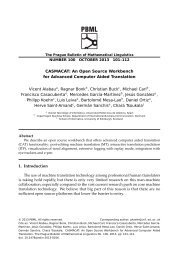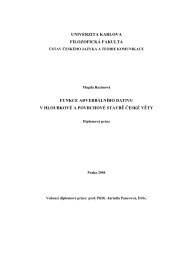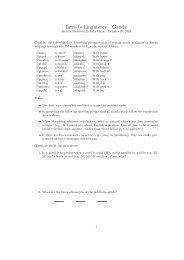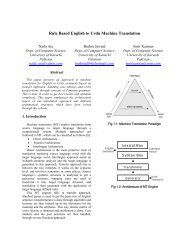Syntax – Valency
Syntax – Valency
Syntax – Valency
You also want an ePaper? Increase the reach of your titles
YUMPU automatically turns print PDFs into web optimized ePapers that Google loves.
Grammatical Roles<br />
Deep <strong>Valency</strong><br />
<strong>Syntax</strong> <strong>–</strong> <strong>Valency</strong><br />
Jirka Hana<br />
Jirka Hana <strong>Syntax</strong> <strong>–</strong> <strong>Valency</strong>
Grammatical Roles<br />
subject (podmět)<br />
object (pˇredmět)<br />
Grammatical Roles<br />
Deep <strong>Valency</strong><br />
complement <strong>–</strong> various meanings<br />
adjunct (pˇríslovečné určení)<br />
Adjunct versus Complement<br />
Transitive and intransitive verbs<br />
Jirka Hana <strong>Syntax</strong> <strong>–</strong> <strong>Valency</strong>
Grammatical Roles<br />
subject (podmět)<br />
object (pˇredmět)<br />
Grammatical Roles<br />
Deep <strong>Valency</strong><br />
complement <strong>–</strong> various meanings<br />
adjunct (pˇríslovečné určení)<br />
Adjunct versus Complement<br />
Transitive and intransitive verbs<br />
In some theories, these notions are primitive (undefined), in some<br />
theories they are defined in terms of other notions. For example, subject<br />
can be defined structurally as the NP in S → NP VP.<br />
Jirka Hana <strong>Syntax</strong> <strong>–</strong> <strong>Valency</strong>
Subject (podmět)<br />
Grammatical Roles<br />
Deep <strong>Valency</strong><br />
Adjunct versus Complement<br />
Transitive and intransitive verbs<br />
Roughly: The active participant in the active sentence.<br />
(1) a. John writes a letter.<br />
b. However: John underwent torture (at the hands of the<br />
terrorists).<br />
Note: We are defining a syntactic notion using semantics. It works in<br />
most of the cases, however not always.<br />
Jirka Hana <strong>Syntax</strong> <strong>–</strong> <strong>Valency</strong>
complement<br />
Grammatical Roles<br />
Deep <strong>Valency</strong><br />
Adjunct versus Complement<br />
Transitive and intransitive verbs<br />
Various meanings:<br />
object <strong>–</strong> the meaning used here<br />
object or subject, i.e., non-adjunct<br />
(doplněk) modifier of both the verb and an object/subject.<br />
(2) The task seems hard. <strong>–</strong> hard is subject complement<br />
(3) I consider the task hard. <strong>–</strong> hard is object complement<br />
Jirka Hana <strong>Syntax</strong> <strong>–</strong> <strong>Valency</strong>
Grammatical Roles<br />
Deep <strong>Valency</strong><br />
Adjunct versus Complement<br />
Transitive and intransitive verbs<br />
subcategorization, (surface-)valency (frame) <strong>–</strong> list of<br />
complements of a word (usually a verb)<br />
Jirka Hana <strong>Syntax</strong> <strong>–</strong> <strong>Valency</strong>
Grammatical Roles<br />
Deep <strong>Valency</strong><br />
adjunct (pˇríslovečné určení)<br />
(4) a. John eats [often].<br />
b. John eats [loudly].<br />
c. John eats [in the morning].<br />
d. John eats [when he gets hungry].<br />
Adjunct versus Complement<br />
Transitive and intransitive verbs<br />
e. John eats [in a restaurant] [on Sunday].<br />
Jirka Hana <strong>Syntax</strong> <strong>–</strong> <strong>Valency</strong>
Grammatical Roles<br />
Deep <strong>Valency</strong><br />
Adjunct versus Complement<br />
Adjunct versus Complement<br />
Transitive and intransitive verbs<br />
complements adjuncts<br />
combine with particular verbs can combine with any verb (mostly)<br />
cannot be repeated can be repeated<br />
their meaning is determined by the verb have meaning on their own<br />
usually NPs, PPs usually AdvPs, PPs<br />
Jirka Hana <strong>Syntax</strong> <strong>–</strong> <strong>Valency</strong>
Grammatical Roles<br />
Deep <strong>Valency</strong><br />
Transitive and intransitive verbs<br />
Adjunct versus Complement<br />
Transitive and intransitive verbs<br />
Intransitive verb <strong>–</strong> a verb with a subject and no objects: sleep,<br />
snore<br />
(5) a. John snores.<br />
b. *John snores a book.<br />
Transitive verb <strong>–</strong> a verb with a subject and an object: buy, brush,<br />
write, catch<br />
(6) a. John buys a candy.<br />
b. *John buys.<br />
Some verbs are both intransitive and transitive: dance <strong>–</strong> John dances ×<br />
John dances samba.<br />
Jirka Hana <strong>Syntax</strong> <strong>–</strong> <strong>Valency</strong>
Grammatical Roles<br />
Deep <strong>Valency</strong><br />
Adjunct versus Complement<br />
Transitive and intransitive verbs<br />
Ditransitive verbs <strong>–</strong> a subclass of transitive verbs, take two objects<br />
(direct & indirect).<br />
(7) a. John give a book to his friend.<br />
b. John gives his friend a nice book.<br />
c. A nice book is given to Mary by John.<br />
d. Mary is given a nice book by John.<br />
Jirka Hana <strong>Syntax</strong> <strong>–</strong> <strong>Valency</strong>
Deep <strong>Valency</strong><br />
Grammatical Roles<br />
Deep <strong>Valency</strong><br />
<strong>Syntax</strong> vs. Semantics<br />
The Mainstream U.S. view of Deep <strong>Valency</strong><br />
The concepts of this section are on the interface of syntax and semantics.<br />
Some theories are grounded more in syntax, some more in semantics.<br />
Jirka Hana <strong>Syntax</strong> <strong>–</strong> <strong>Valency</strong>
<strong>Syntax</strong> vs. Semantics<br />
Compare:<br />
(8) a. I ate a cake.<br />
b. I entered a room.<br />
Grammatical Roles<br />
Deep <strong>Valency</strong><br />
<strong>Syntax</strong> vs. Semantics<br />
The Mainstream U.S. view of Deep <strong>Valency</strong><br />
The sentences have the same syntactic structure <strong>–</strong> both a cake and a<br />
room are (direct) objects, but the cake disappeared after I ate it, while<br />
the room did not after I entered it.<br />
Jirka Hana <strong>Syntax</strong> <strong>–</strong> <strong>Valency</strong>
Compare:<br />
Grammatical Roles<br />
Deep <strong>Valency</strong><br />
(9) a. I took my friend to Brno.<br />
b. I took D1 to Brno.<br />
<strong>Syntax</strong> vs. Semantics<br />
The Mainstream U.S. view of Deep <strong>Valency</strong><br />
Both my friend and D1 (the freeway) are direct objects, but . . .<br />
Note: Below, we focus on verbs only.<br />
Jirka Hana <strong>Syntax</strong> <strong>–</strong> <strong>Valency</strong>
Grammatical Roles<br />
Deep <strong>Valency</strong><br />
<strong>Syntax</strong> vs. Semantics<br />
The Mainstream U.S. view of Deep <strong>Valency</strong><br />
The Mainstream U.S. view of Deep <strong>Valency</strong><br />
Sources: Charles Fillmore (1968, The Case for Case), David Dowty<br />
(1979, Word meaning and Montague grammar), Ray Jackendoff (1983,<br />
Semantics and cognition), etc.<br />
Jirka Hana <strong>Syntax</strong> <strong>–</strong> <strong>Valency</strong>
Grammatical Roles<br />
Deep <strong>Valency</strong><br />
<strong>Syntax</strong> vs. Semantics<br />
The Mainstream U.S. view of Deep <strong>Valency</strong><br />
(10) a. The janitor opens the door with a key. (key <strong>–</strong> instrument)<br />
b. The key opens the door. (key <strong>–</strong> instrument)<br />
Jirka Hana <strong>Syntax</strong> <strong>–</strong> <strong>Valency</strong>
Thematic role<br />
Grammatical Roles<br />
Deep <strong>Valency</strong><br />
<strong>Syntax</strong> vs. Semantics<br />
The Mainstream U.S. view of Deep <strong>Valency</strong><br />
Thematic role <strong>–</strong> semantic counterpart of grammatical function:<br />
agent one who deliberately does the action<br />
cause mindlessly performs the action<br />
experiencer has sensory or mental experience<br />
patient thing that the action happens to<br />
theme thing or being that is in a state/location<br />
source origin of a change in location/possesion<br />
goal/recipient endpoint of a change in location/possesion<br />
instrument the means of accomplishing the action<br />
etc<br />
Jirka Hana <strong>Syntax</strong> <strong>–</strong> <strong>Valency</strong>
Grammatical Roles<br />
Deep <strong>Valency</strong><br />
<strong>Syntax</strong> vs. Semantics<br />
The Mainstream U.S. view of Deep <strong>Valency</strong><br />
The exact set is theory dependent. For example, some theories do not<br />
distinguish between patient and theme. Some theories allow a single<br />
constituent to have multiple roles, some don’t.<br />
Jirka Hana <strong>Syntax</strong> <strong>–</strong> <strong>Valency</strong>
(11) a.<br />
b.<br />
c.<br />
d.<br />
e.<br />
f.<br />
John<br />
agent<br />
John<br />
theme<br />
John<br />
theme<br />
Grammatical Roles<br />
Deep <strong>Valency</strong><br />
ate the Cheerios<br />
patient<br />
fell.<br />
is polite.<br />
John<br />
experiencer<br />
John<br />
agent/source<br />
John<br />
goal<br />
cought the flu.<br />
theme<br />
<strong>Syntax</strong> vs. Semantics<br />
The Mainstream U.S. view of Deep <strong>Valency</strong><br />
with a spoon.<br />
instrument<br />
heard the explosion.<br />
theme<br />
gave a a book<br />
theme<br />
Jirka Hana <strong>Syntax</strong> <strong>–</strong> <strong>Valency</strong><br />
Mary.<br />
goal
Grammatical Roles<br />
Deep <strong>Valency</strong><br />
<strong>Syntax</strong> vs. Semantics<br />
The Mainstream U.S. view of Deep <strong>Valency</strong><br />
Important: The roles reflect how the speaker structures the reality, not<br />
necesarrily the reality itself.<br />
(12) a. John broke the window.<br />
(John <strong>–</strong> Agent)<br />
b. The hammer broke the window.<br />
(the hammer <strong>–</strong> Instrument)<br />
c. The storm broke the window.<br />
(the storm <strong>–</strong> Causer)<br />
Jirka Hana <strong>Syntax</strong> <strong>–</strong> <strong>Valency</strong>
Grammatical Roles<br />
Deep <strong>Valency</strong><br />
<strong>Syntax</strong> vs. Semantics<br />
The Mainstream U.S. view of Deep <strong>Valency</strong><br />
Going too far? Is it still linguistics? What if John was<br />
coerced/hypnotised?<br />
Jirka Hana <strong>Syntax</strong> <strong>–</strong> <strong>Valency</strong>
Grammatical Roles<br />
Deep <strong>Valency</strong><br />
<strong>Syntax</strong> vs. Semantics<br />
The Mainstream U.S. view of Deep <strong>Valency</strong><br />
Going too far? Is it still linguistics? What if John was<br />
coerced/hypnotised?<br />
However, Agents and Causers sometimes behave grammatically<br />
differently:<br />
(14) a. The pressure/explosion/Wills banging broke the window.<br />
b. John broke the window.<br />
c. The window broke from the pressure/explosion/Wills banging.<br />
d. *The window broke from John.<br />
Jirka Hana <strong>Syntax</strong> <strong>–</strong> <strong>Valency</strong>









